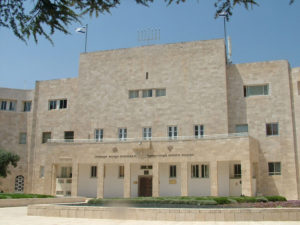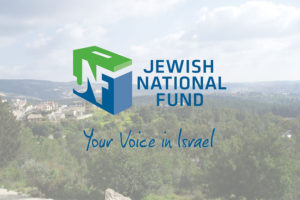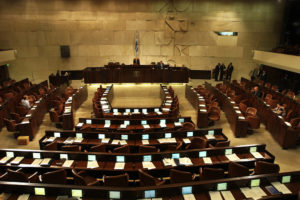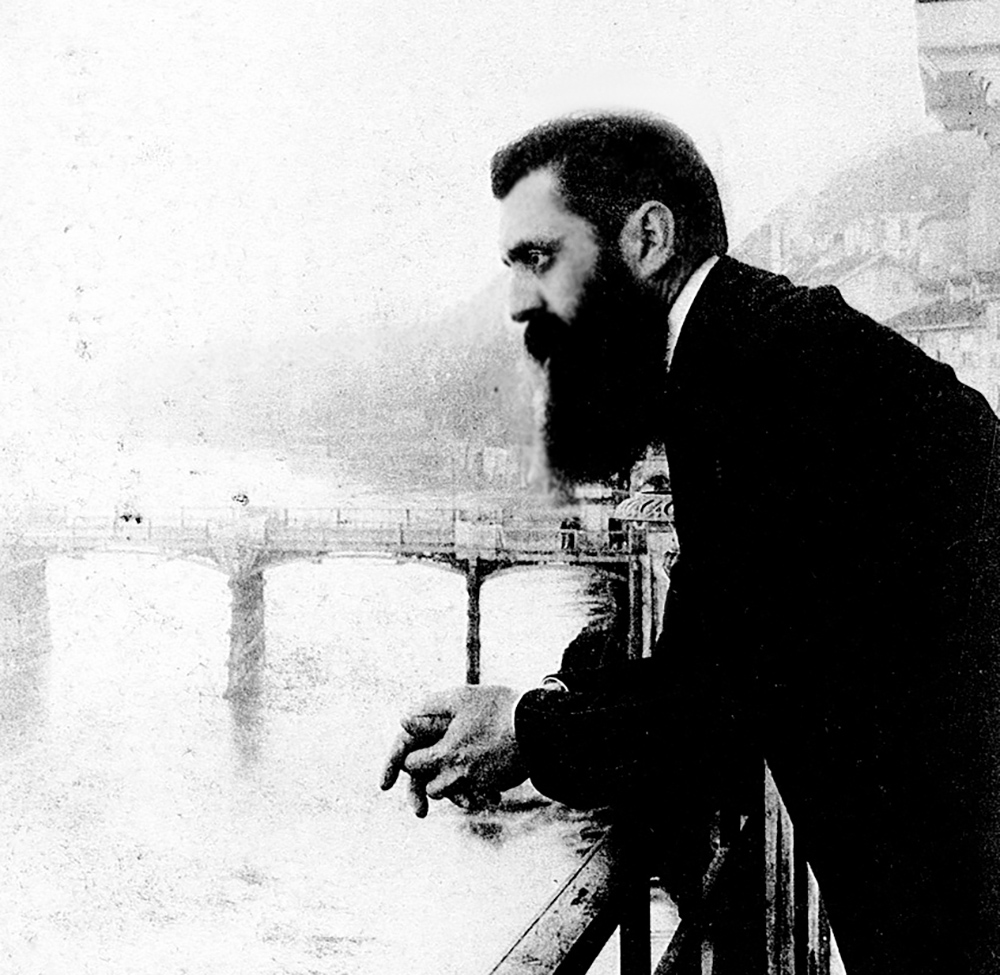By: David Ben Hooren
As the maddening world around seems to have us fixated in historic impeachment hearings, potential military engagement with Iran, and the third Israeli Knesset election in less than a year, most American Jews are now in for yet another shocking revelation on the political landscape.
For those not in the know, the time has arrived once again for a conglomeration of Jewish organizations to compete against one another in the frenetic voting for the 38th World Zionist Congress.

Hmm… as you sit there and scratch your heads and wonder what why you may never have even heard of a World Zionist Congress election or precisely what the WZC does or stands for, allow us to allay your concerns by informing you that you are in very good company.
Yes, the lion’s share of those who identify as Jewish in the United States and Canada have absolutely no clue whatsoever that a World Zionist Congress was on the horizon for 2020, let alone the fact that they could actually cast a vote in this enigmatic election. All that is necessary to meet the eligibility criteria is to be at least 18 years old on June 30, 2020, self-identify as Jewish, reside in the U.S., not vote in the March 2020 Knesset election, and check a box that you agree with the Jerusalem Program. The Jerusalem Program states that “Zionism, the national liberation movement of the Jewish people, brought about the establishment of the State of Israel, and views a Jewish, Zionist, democratic and secure State of Israel to be the expression of the common responsibility of the Jewish people for its continuity and future.”
For starters, a background on the World Zionist Congress is necessary to put this upcoming election in the proper context.
The first World Zionist Congress was held in 1897 in Basel, Switzerland and was the brainchild of the founder of modern Zionism; the legendary Theodore Herzl. The Congress met each year until the early years of the new century. Thereafter the Congress convened every five years. The original Congress formulated a Zionist platform, known as the Basel program, and founded the Zionist Organization, which in 1960 was renamed the World Zionist Organization.
One of the functions of the World Zionist Congress is to set not only policy for the bedrock of Zionist organizations such as the World Zionist Organization but that of the powerful Jewish Agency of Israel, the Jewish National Fund, the Keren Kayemet in Israel, among others.
Currently, there are 15 slates competing for representation at the World Zionist Congress which is scheduled to take place in October 2020. These slates are comprised of people and organizations who emanate from the across the political spectrum. Leftist progressive groups, right-wing religious organizations, middle-of-the-road types, etc., to name just a few.
It appears that the driving force that incentivizes many of these slates in their feverish race to the elections finishing line is the sizable amount of money that the WZO controls. According to an article in the Forward, voting for slates will “determine the American delegation–152 of the 500 total participants–to the WJC in Jerusalem in October, which will in turn determine $5 billion in spending on Jewish causes over the next five years. Any United States permanent resident who is Jewish and signs a statement supporting Zionism is eligible to vote–though much of that is on the honor system.”
Moreover, some experienced voices opine that slate members who are elected also wield a significant amount of influence in the policy making department of the Israeli government while others suggest that this assumption of power is the furthest thing from the truth.

Speaking on the condition of anonymity, a now-retired chief executive officer of a major American Jewish organization with over 40 years on the job told the Jewish Voice in an exclusive interview: “I can tell you that the WZC is no longer considered a formidable or relevant organization.” He remarked in a rueful tone: “The reality is that during the pre-state days of Israel; when the nascent Jewish state was coming into its own as well as in the first 50 years of Israel’s existence as a modern state, the official Zionist movement played a major role in policy decision, education, and Aliyah efforts, among other things.”
He added: “There was definitely a well-defined role for a World Zionist Congress as the representative body of the Jewish nation, but now that has been replaced by Israel. The WZC is now electing leaders that no one has any clue about. Essentially, the Jewish people are no longer beholden to the Zionist movement, yet the WZC continues to be a political entity that has no purpose anymore. They have become archaic, obsolete and somewhat of an anachronism that desperately wants to cling to the past.”
When queried as to whether the WZC can ever serve a pragmatic function again in the Jewish arena, the well-informed source said, “They (the WZC) must reconfigure themselves so that they may maintain even a modicum of relevance to the contemporary reality in which we live.”
Pertaining to the issue of why only 57,000 American Jews cast their votes in the WZC election as compared to a population of millions of Jews in the United States and Canada who support Israel and would fulfill the eligibility criteria, the retired CEO said, “The powers that be at the WZC do not want the masses to be aware of such an election. They want to keep the voting body limited to essentially the leaders of the slates and their diminutive minions as well as assorted acolytes.”
Another source speaking on the condition of anonymity who is keenly familiar with the voting process during the elections for the World Zionist Congress said, “Another problem has been kind of a power grab by the ‘old guard’ and by that I mean parties and slates that have been around since the formal inception of modern Israel in 1948 and even some who were around before then.” The source added, “many of these slates have been grandfathered in and are automatically placed on the ballot without having to garner delegates or signatures. One example of this is the Hadassah Organization, which is the women’s division of the World Zionist Organization.”
Addressing the issue of why the World Zionist Congress elections committee did not make efforts to publicize, promote or advertise the voting process that began on January 21st and concludes on March 11th, Herbert Block, the executive director of the American Zionist Movement, told the Jewish Voice in a telephone interview that while advertising is a good idea, “the movement does not have adequate financing for that” but that “everyone who supports the Zionist enterprise is welcome to vote so that all views can be represented in the Israeli government policy committees.”
Concerning the requisite voting fees to participate in the WZC elections, Mr. Block said that the fees charged for adults ($7.50) and discounted rates for those under the age of 25 ($5.00) will generate enough funding to cover the cost of operating the election. Mr. Block said that paying to cast a vote hearkens back to the father of Zionism himself, Theodore Herzl, who instituted a system where voting privileges could be secured by purchasing a “Zionist shekel.”
Rabbi Dr. Eli Abadie, longtime congregational leader and senior rabbi at the Sephardic synagogue in Manhattan told the Jewish Voice that many Jews do not take part in the WZC because “the elections are every five years and many people forget about them. In addition, there is not enough advertising of the elections and it is mostly advertised in Jewish media outlets, synagogue and some JCCs. However, the majority of Jews are not affiliated to any of those, so they are not aware of the elections and their importance.”
Speaking from personal experience, Rabbi Abadie offered an explanation as to precisely how the voting process for the WZC is conducted and where the monies are being directed to. He said, “every election cycle, established lists of members of AZM and also new lists can be enlisted to run, as long as they follow the rules and regulations of the Area Election Committee (AEC) of the American Zionist Movement (AZM). The control of monies is given to every party in Israel that has affiliated organizations or lists in the US based on the amount of mandates they receive. The more the mandates; the more the funding.”

Rabbi Abadie added: “Most of the money stays on Israel, even though it should be disbursed here in the US. If most or all of the money is kept in Israel, then there is not much power for the American groups to do anything. Anyhow, even politically, most of the Zionist Congress resolutions are useless and non-binding. It is a Congress of the Jewish People that has no territory, no enforcing capabilities or authority. Therefore, most of their power is imaginary with no real effect.”
Rabbi Abadie, (who is also a renowned gastroenterologist), founded the Ohavei Zion – World Sephardic Zionist Organization (WSZO) Inc along with Rabbi David Bibi in the US in 2015, and is a member of the American Zionist Movement (AZM).
Rabbi Abadie said, “with a group of people who supported us in the United States, we formed a board of directors and officially incorporated Ohavei Zion – WSZO, as an independent Zionist organization in 2016, bot affiliated with any party or faction; free to associate with any Israeli party during any Zionist Congress.”
He added, “Ohavei Zion ran for the 37th Zionist Congress of 2016 and we received votes that gave us seven mandates/seats. Ohavei Zion participated in the World Zionist Congress, in all is committees and votes.”
Ohavei Zion was established so that the traditional Sephardic community will have a voice and an influence on the direction of Jewish education within their communities and throughout the world, said Rabbi Abadie. He added, “This will enable us to provide funding for programs in support of Jewish Education and Identity, Zionism and the support of the State of Israel as the Jewish Homeland.”
“We, as Sephardim must chart our future within the Jewish People in our unique way based on our Torah Tradition, values and inclusiveness. For too long we have been silent. The time has come to take responsibility to share the beauty of our Sephardic Heritage with our Jewish brethren and to allow our voice to be heard, “ declared Rabbi Abadie.
Ohavei Zion is comprised of a list of delegates from all segments of the Jewish People representing our various and unique communities across the United States with the support of our Sages, Rabbis and leaders, he added. The platform of Ohavei Zion includes the following:
1–Ensuring the future of the Jewish people by furthering Jewish and Zionist education, and promoting spiritual and cultural Sephardic values and heritage.
2–Fostering the centrality of Israel as the Home of the Jewish People by facilitating Aliyah and populating the Land of Israel.
3–Partaking in the dissemination of substantial funds allocated by Israel and the WZO for Jewish Education and Identity, and securing its distribution to our Sephardic educational institutions.
4–Instilling a love of Torah values and the appreciation of Missvot
5–Pursuing Jewish unity and respect for each other
6–Defending the rights of Jews anywhere in the world against all manifestations of anti-Semitism/anti-Zionism
7–Combating assimilation through Jewish pride and identity
Sarah Manning, a spokesperson for the Shas Olami slate, said that the organization that she represents is a cohesive group of Sephardic synagogues and community centers representing congregations from across the globe who have united for the purpose of preserving and actively maintaining cherished Sephardic traditions, values and ethics.
Speaking to the Jewish Voice about the fact that the “progressive” or left-wing slates seem to have made formidable inroads in the policy making department in the last WZC elections, Ms. Manning said that “the religious parties weren’t keeping their eye on the ball in the last election. Somehow, the progressive camp which includes such groups as J Street, New Israel Fund, T’ruah, Hashomer Hatzair, Habonim Dror were able to garner enough votes to be funded accordingly and were given a voice that they never had before in government decision making.”
The implications of the progressive Left’s determination to influence the very definition of the whole Zionist enterprise is something that cannot be overlooked. Rather, it sends a message that these groups – with opinions vis-a-vis Israel which are more than occasionally hostile – do not consider such elections to be passé.
On January 20th, Ms. Manning issued a press release from Shas Olami which said, “The leadership of Shas in Israel, headed by Chairman Rabbi Aryeh Deri, has announced the participation of Shas Olami in the 2020 elections for the World Zionist Congress. Confirmation of their participation was delayed by a legal dispute and attempts by members of the Zionist Federation to stop Shas from fielding a slate in the elections. After a legal battle, the matter was referred for adjudication by the WZO governing organization, and it was agreed that Shas Olami would put together a slate of candidates.
Established at the request of the founder of Shas, Maran HaRav Ovadya Yosef zt”l, Shas Olami works with Sephardic communities from all over the world under the banner of the World Union of Sephardic Communities. Over the past 3 years, they have hosted conferences in Israel for rabbis and community leaders from the United States and worldwide. They gather to discuss issues of shared concern, such as strengthening Jewish and Sephardic identity, the integration of Zionism into education, the management of communities, and the strengthening of Torah study and mitzvah observance in Sephardic communities around the world.”
Elizabeth Berney, the director of Special Projects at the Zionist Organization of America (ZOA) said part of the reason people don’t know about the WZC election is that “the election happens only once every five years. Five years is a very long time to not hear or think about an election. There are no primaries, etc. before the election to evoke interest, as occurs in governmental elections in the U.S. The timing is also bad. The 2020 election is in the dead of winter, when people are not particularly tuned into elections. I think that if the election more closely followed the American election calendar, the turnout and interest would be better. I tried to change the timing, but other slates supported the winter voting period (January 21 to March 11).”
Ms. Berney added that, “The key substantive reason why turnout is so low is that people don’t realize what is at stake. Left-leaning groups have been using the WZC elections to try to impose their agenda on Israel. Left-leaning groups are actually openly stating now that they are running to “divert” funding “away from the entrenchment of the occupation” and to “end funding of the settlements.” That is really a form of boycott against 750,000 Jews living over the green line.”
Ms. Berney also related that a WZO department that is now under the control of a left-leaning slate has produced and presently distributes “educational” film materials condemning Israel’s vital security measures such as checkpoints; and praising an anti-Israel NGO that harasses Israeli soldiers at checkpoints and tells Europeans to divest from Israel.
On a more sanguine note, Ms. Berney said that “the ZOA Coalition is working to change this dangerous situation, and to alert people to the necessity to vote for our ZOA Coalition of 27 strongest pro-Israel groups. The ZOA Coalition is fighting to end harmful WZO programs that criticize Israel’s vital security measures. The ZOA Coalition has a strong record of accomplishment, including initiating and obtaining passage of a resolution to establish a program teaching about legal rights of the Jewish people to the Land of Israel.”
She added that the ZOA Coalition promotes positive Zionist and Jewish education, showing Israeli society’s beauty, defending Israel’s and the Jewish people’s rights and security, and respecting religious Jews, tradition – and all Jews.
Another problem is the lack of transparent voting at WZC and AZM sessions, Ms. Berney said. “The ZOA Coalition believes that every delegate’s vote at World Zionist Congress and AZM meetings should be recorded, and made available to the public. This would help the public understand what they are really voting for and create both an informed electorate and interest in the WZC,” added Ms. Berney.
She said, “people might be very upset if they knew how their representatives voted.”
“For instance, at a large AZM board meeting on June 3, 2019, when we voted on AZM’s anti-Semitism policy, ZOA Coalition was the ONLY slate that voted to retain a clause saying that anti-Semitism is ‘manifested in activities such as anti-Zionism.’ EVERY other slate present voted to REMOVE this important clause,” she said most emphatically.
Referencing the current uptick of anti-Semitic attacks on Jews in the greater New York City area, Ms. Berney said, “the ZOA Coalition believes that in this era of increasing anti-Semitism and danger to the Jewish people, WZO funds must be used for the good and safety of the entire Jewish people – and not to fund particular slates. ZOA Coalition has never sought funds for itself. Rather, ZOA Coalition is leading a battle to require that WZO funds must be used to combat anti-Semitism and BDS, strengthen Zionist and Jewish education, and p
 rioritize Aliyah and rescuing Jews who are in danger due to rising global antisemitism.”
rioritize Aliyah and rescuing Jews who are in danger due to rising global antisemitism.”
Meir Jolovitz, a former ZOA national executive director, and more recently the director of Brooklyn’s Sephardic Community Center, offered his views to the Jewish Voice as to why more Jews do not participate in WZC elections.
Now residing in Arizona, Mr. Jolovitz said, “I conduct a weekly lecture series about Israel, with a twin focus on Israeli affairs – geostrategic and internal – as well as its symbiotic connection to the American Jewish community. The deep interest in the Zionist experience of those who attend regularly is unfortunately not representative of American Jewry in general. With Israel longer seen as facing an existential threat from its enemies, the commitment to Israel has dissipated. There exists an undeniable fact: today’s generation of American Jews suffers in comparison to those of the previous in its engagement to Israel’s needs. Make no mistake, it is cause for concern.”
Jolovitz cited the 2012 Pew Poll, done in conjunction with the AJC, which was quite telling: American Jews are, by and large, disinterested in the Zionist enterprise. Subsequent polls have supported that reality. Therefore, he suggested, we need to pay careful attention to the present WZC elections, because the anti-Israel “progressive” voices are doing exactly that.
There seems that an obvious conclusion ought to be drawn from an examination of the coming elections. One might argue that that the generations-old Zionist elections no longer carry the influence nor the significance that they enjoyed yesteryear – but to ignore its importance today is to quietly cede control to elements that are found wanting by the traditional definition of Zionism. We turn a blind eye to some of these “stealth” votes and voices at our own peril. Israel, and world Jewry deserve better.
David Ben Hooren is a veteran journalist and is currently the publisher of the Jewish Voice



